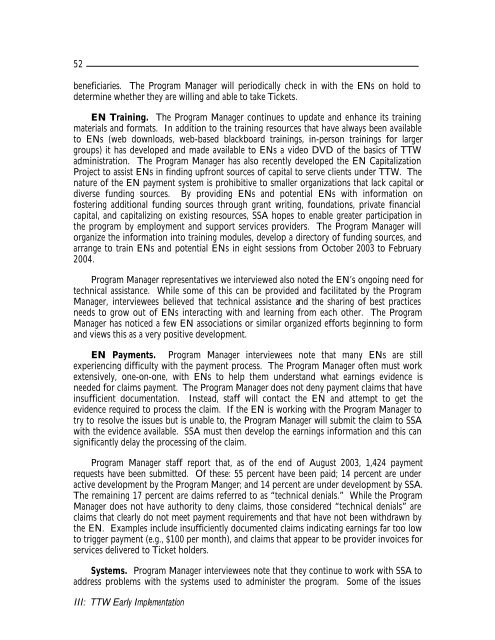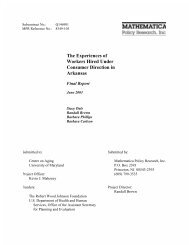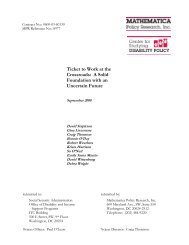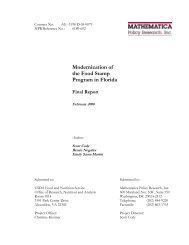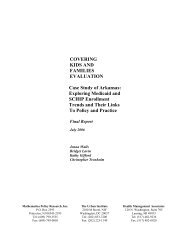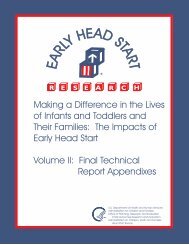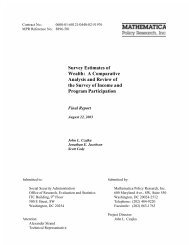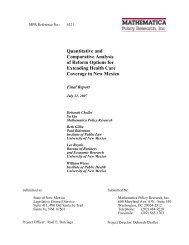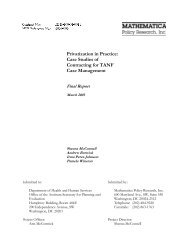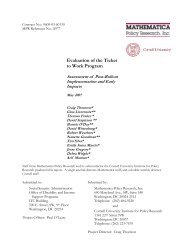Evaluation of the Ticket to Work Program Initial Evaluation Report
Evaluation of the Ticket to Work Program Initial Evaluation Report
Evaluation of the Ticket to Work Program Initial Evaluation Report
You also want an ePaper? Increase the reach of your titles
YUMPU automatically turns print PDFs into web optimized ePapers that Google loves.
52<br />
beneficiaries. The <strong>Program</strong> Manager will periodically check in with <strong>the</strong> ENs on hold <strong>to</strong><br />
determine whe<strong>the</strong>r <strong>the</strong>y are willing and able <strong>to</strong> take <strong>Ticket</strong>s.<br />
EN Training. The <strong>Program</strong> Manager continues <strong>to</strong> update and enhance its training<br />
materials and formats. In addition <strong>to</strong> <strong>the</strong> training resources that have always been available<br />
<strong>to</strong> ENs (web downloads, web-based blackboard trainings, in-person trainings for larger<br />
groups) it has developed and made available <strong>to</strong> ENs a video DVD <strong>of</strong> <strong>the</strong> basics <strong>of</strong> TTW<br />
administration. The <strong>Program</strong> Manager has also recently developed <strong>the</strong> EN Capitalization<br />
Project <strong>to</strong> assist ENs in finding upfront sources <strong>of</strong> capital <strong>to</strong> serve clients under TTW. The<br />
nature <strong>of</strong> <strong>the</strong> EN payment system is prohibitive <strong>to</strong> smaller organizations that lack capital or<br />
diverse funding sources. By providing ENs and potential ENs with information on<br />
fostering additional funding sources through grant writing, foundations, private financial<br />
capital, and capitalizing on existing resources, SSA hopes <strong>to</strong> enable greater participation in<br />
<strong>the</strong> program by employment and support services providers. The <strong>Program</strong> Manager will<br />
organize <strong>the</strong> information in<strong>to</strong> training modules, develop a direc<strong>to</strong>ry <strong>of</strong> funding sources, and<br />
arrange <strong>to</strong> train ENs and potential ENs in eight sessions from Oc<strong>to</strong>ber 2003 <strong>to</strong> February<br />
2004.<br />
<strong>Program</strong> Manager representatives we interviewed also noted <strong>the</strong> EN’s ongoing need for<br />
technical assistance. While some <strong>of</strong> this can be provided and facilitated by <strong>the</strong> <strong>Program</strong><br />
Manager, interviewees believed that technical assistance and <strong>the</strong> sharing <strong>of</strong> best practices<br />
needs <strong>to</strong> grow out <strong>of</strong> ENs interacting with and learning from each o<strong>the</strong>r. The <strong>Program</strong><br />
Manager has noticed a few EN associations or similar organized efforts beginning <strong>to</strong> form<br />
and views this as a very positive development.<br />
EN Payments. <strong>Program</strong> Manager interviewees note that many ENs are still<br />
experiencing difficulty with <strong>the</strong> payment process. The <strong>Program</strong> Manager <strong>of</strong>ten must work<br />
extensively, one-on-one, with ENs <strong>to</strong> help <strong>the</strong>m understand what earnings evidence is<br />
needed for claims payment. The <strong>Program</strong> Manager does not deny payment claims that have<br />
insufficient documentation. Instead, staff will contact <strong>the</strong> EN and attempt <strong>to</strong> get <strong>the</strong><br />
evidence required <strong>to</strong> process <strong>the</strong> claim. If <strong>the</strong> EN is working with <strong>the</strong> <strong>Program</strong> Manager <strong>to</strong><br />
try <strong>to</strong> resolve <strong>the</strong> issues but is unable <strong>to</strong>, <strong>the</strong> <strong>Program</strong> Manager will submit <strong>the</strong> claim <strong>to</strong> SSA<br />
with <strong>the</strong> evidence available. SSA must <strong>the</strong>n develop <strong>the</strong> earnings information and this can<br />
significantly delay <strong>the</strong> processing <strong>of</strong> <strong>the</strong> claim.<br />
<strong>Program</strong> Manager staff report that, as <strong>of</strong> <strong>the</strong> end <strong>of</strong> August 2003, 1,424 payment<br />
requests have been submitted. Of <strong>the</strong>se: 55 percent have been paid; 14 percent are under<br />
active development by <strong>the</strong> <strong>Program</strong> Manger; and 14 percent are under development by SSA.<br />
The remaining 17 percent are claims referred <strong>to</strong> as “technical denials.” While <strong>the</strong> <strong>Program</strong><br />
Manager does not have authority <strong>to</strong> deny claims, those considered “technical denials” are<br />
claims that clearly do not meet payment requirements and that have not been withdrawn by<br />
<strong>the</strong> EN. Examples include insufficiently documented claims indicating earnings far <strong>to</strong>o low<br />
<strong>to</strong> trigger payment (e.g., $100 per month), and claims that appear <strong>to</strong> be provider invoices for<br />
services delivered <strong>to</strong> <strong>Ticket</strong> holders.<br />
Systems. <strong>Program</strong> Manager interviewees note that <strong>the</strong>y continue <strong>to</strong> work with SSA <strong>to</strong><br />
address problems with <strong>the</strong> systems used <strong>to</strong> administer <strong>the</strong> program. Some <strong>of</strong> <strong>the</strong> issues<br />
III: TTW Early Implementation


